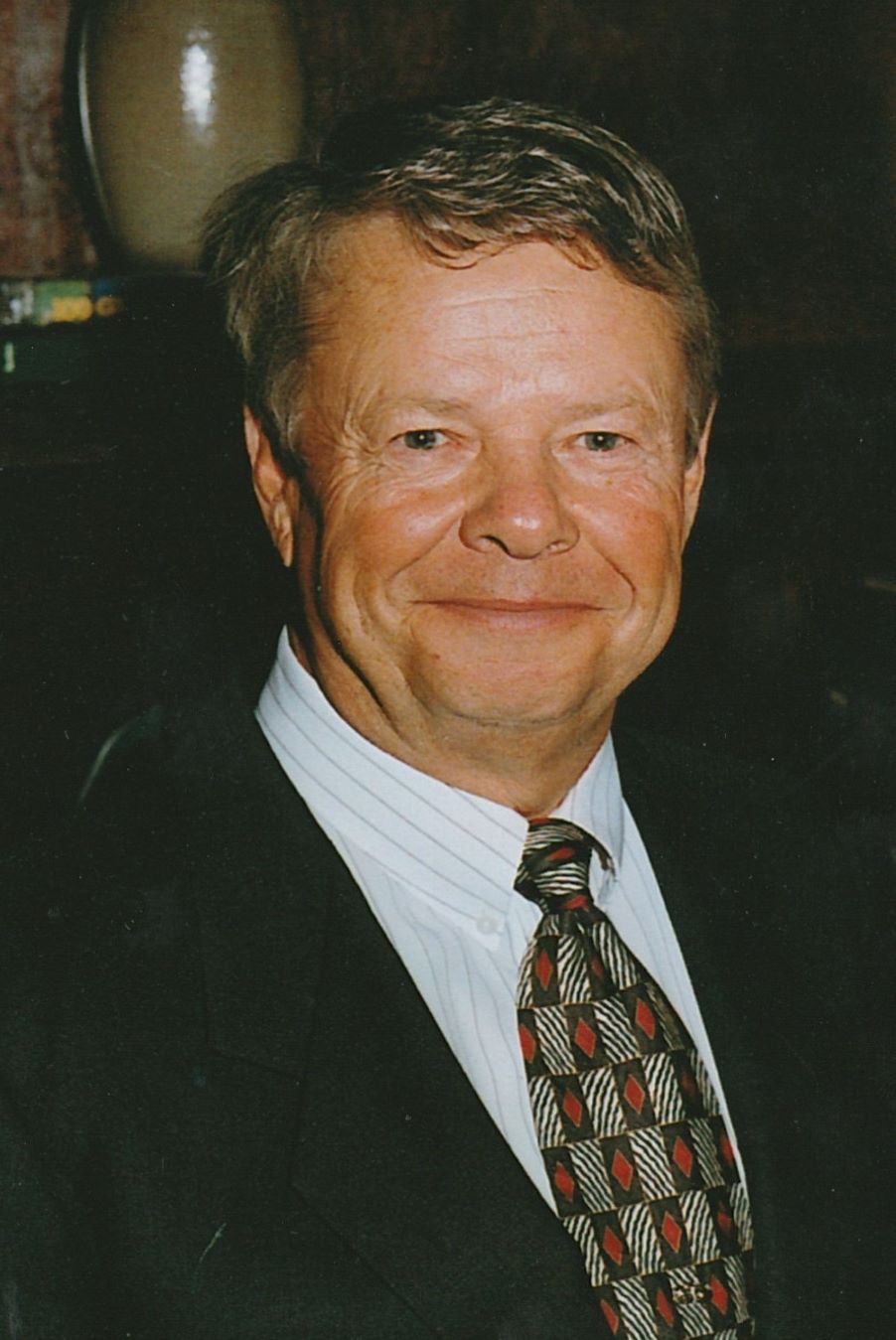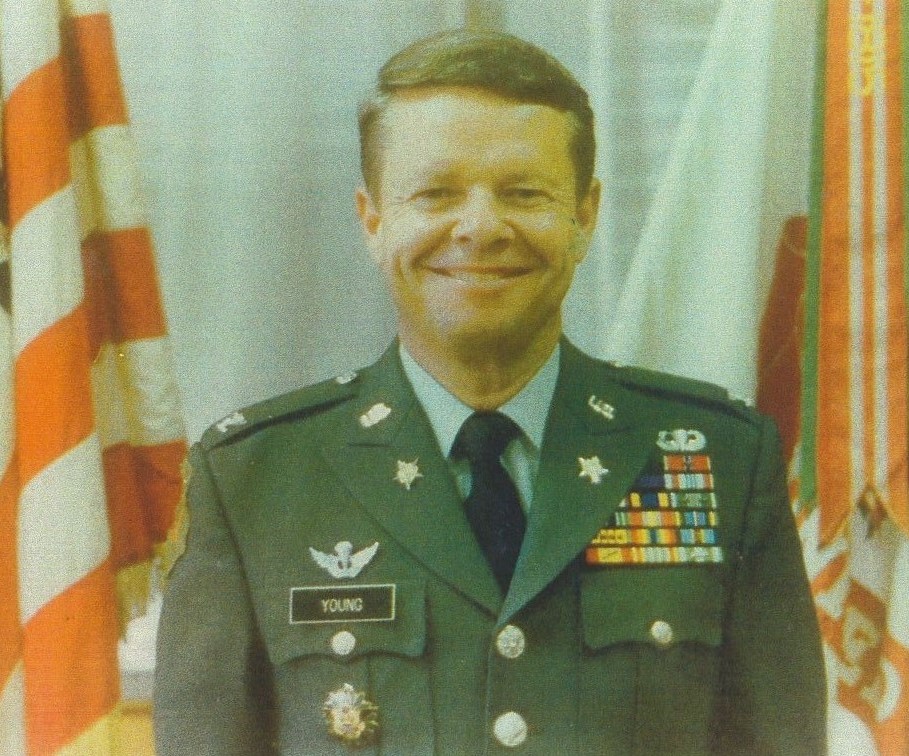Record date:
James V. Young, COL (Ret) US Army
Northeast Asia was interesting business for James V. Young. Spending most of his almost thirty years in the US Army working throughout Vietnam, Korea, Japan, and the Pacific put him on the ground and behind the scenes. Commanding troops, witnessing military coups, and hosting diplomats sounds like the plot of a Tom Clancy novel. For Young, these were the realities of his years in service.
Young graduated from the University of Oklahoma in the Spring of 1963 and was commissioned by the ROTC into the US Army Signal Corps by that fall. Initially training in infantry and artillery, when Young was sent off to Fort Shafter, Hawaii, he was surprised to be assigned to photography work with the United States Army Reserve-Pacific [USAR-PAC] division. With most of the attention on Vietnam, Young relates that USAR-PAC managed a much wider area and included operations in Korea, Laos, and across the Pacific theater. His work with DASPO [Department of the Army Special Photographic Office] and the 221st Signal Company was primarily serving as liaison to ensure operations weren’t overlapping. He would transfer to the 1st Infantry Division for his last year in Vietnam, receiving seven personal combat decorations, including two Bronze Star awards and a Purple Heart while serving as the operations officer and company commander.
In January of 1970, Young opted to follow his interests in pursuing political military matters and policy. As the annual selectee for the Northeast Asia Foreign Area Specialist program, he underwent intensive language training in Korean, formal graduate study, and traveled throughout Asia. The result of his completion was an assignment as the Northeast Asia Desk Officer in 1973. Young conducted detailed analysis of military, economic, and political events in Japan, Korea, and Southeast Asia. Young would then come up on one of the most eventful jobs of his military career, moving on to the assistant attaché position to the US Embassy in Seoul, Korea,
As assistant army attaché, Young had the ability to get to know many political figures and military leaders of South Korea. Young was hosting an event to celebrate his recent promotion to lieutenant colonel when the 12.12 Military Insurrection of 1979 occurred. It was a who’s-who’s of military generals and government officials. When Young’s phone started ringing off the hook for the guests at his home, his suspicions grew. Indeed, the events of the Coup d'état of December Twelfth began at Young’s celebration. Martial law was enacted in South Korea shortly after as the South Korean military worked to reorganize the government following the assassination of President Park Chung Hee, ultimately culminating in the Gwangju Uprising from May 18 to May 27, 1980. During the crucial time between 12.12 and Gwangju, Young was instrumental in helping to keep foreign relations open and promoting stability for the South Korean government.
After the whirlwind of events dominating his tenure as assistant attaché, Young decided it was time to return to troop work. He became Chief of Staff of the 1st Signal Brigade in Seoul from 1980 to ‘81 before returning to the States where he taught at Fort Leavenworth until 1985. Young describes this period in his career as “good family time.” Even stateside, Korean officials who visited Fort Leavenworth would stop-in and invite Young into their homes as he had become well-known in South Korea for his involvement with high profile figures.
Young was called to D.C. in ’85 and would work as the assistant to Korea for the Secretary of Defense [SoD] for a year and a half. At this juncture, Young got to learn how policy works and is made. His studies of the long-term relationships and long-term policies with Korea were published in a major policy study focusing on US-Korean security relations over the next two decades. His work with Secretary Weinberger [SoD] set Young up to return to Korea, this time as the Defense and Army attaché, in 1987. Young was happy to return and confesses that it was the perfect final assignment. Somewhat lighter than his original run as the assistant Army attaché, Young still dealt with the crucial matters, logistics, and finances that continued to keep South Korean and American relations strong. He still mingled with government and military VIPs, even serving as a representative during the 1988 Olympics in Seoul. With nearly thirty years of service under his belt, Young felt it was the right time to retire and did so in 1990.
Not one to hang up quite yet, Young founded JVY Pacific Associates in 1990 operating as a consultant for American companies to present their products to the Asian market. Young would win a company a $100 million contract and would also broker the first commercial deal between an American company and North Korea since before the Korean War. With a long and storied career, Young has still managed to publish his experiences in two books, both in English and Korean; he is the author of Eye on Korea: An Insider Account of Korean-American Relations, which was originally published in Korean and is a national bestseller in South Korea.
Having followed his own father’s footsteps, James V. Young’s three children are also active in the military: two serving as Army officers, and the third as a special agent with Homeland Security. Young, himself, remains active in Veterans’ organization. Citing back to his experience in Vietnam, Young reflects on one of his most memorable moments in service. With Nixon’s Vietnamization agenda underway, like many other soldiers, Young knew that eventually US Troops would be leaving Vietnam. Restructuring his orders, Young is confident his commands saved countless men from being lost and he is very grateful to have done so. He is also proud to have served alongside the countless individuals that helped make America’s work in Korea a success and counts it as “a pretty good achievement” in his eyes.













